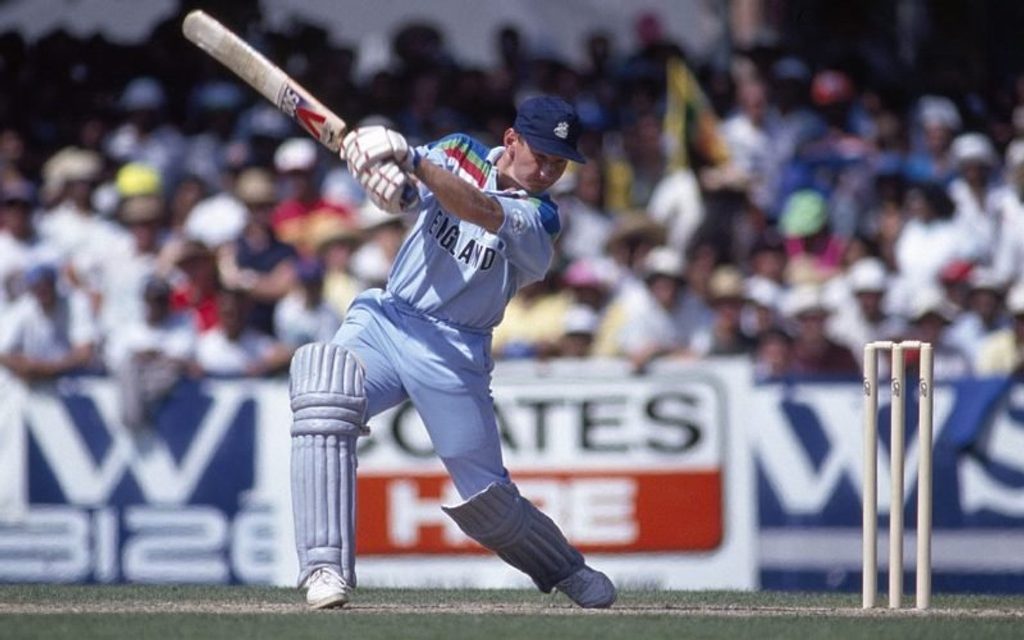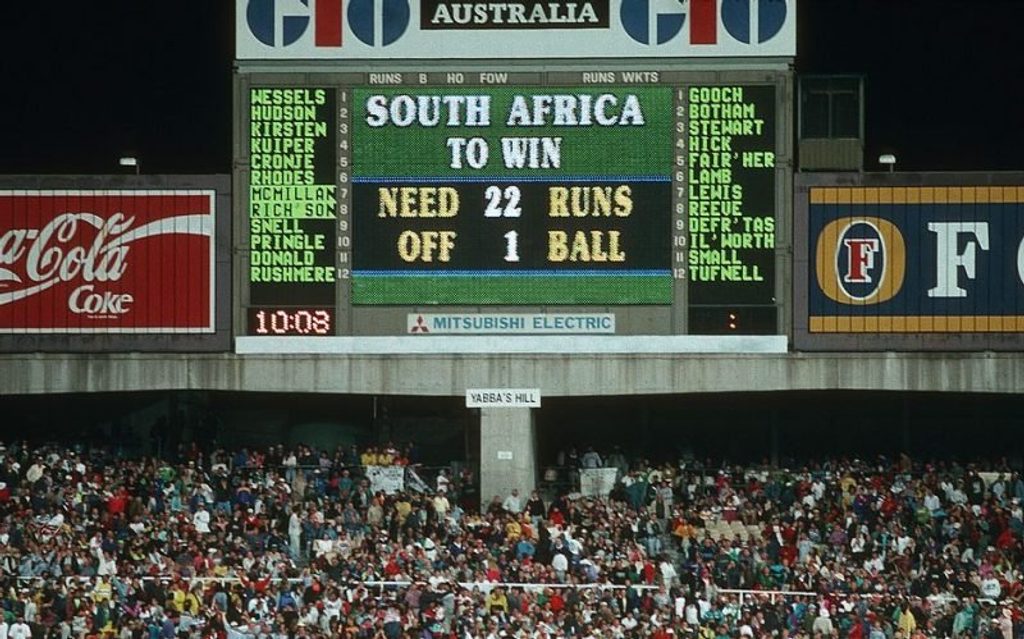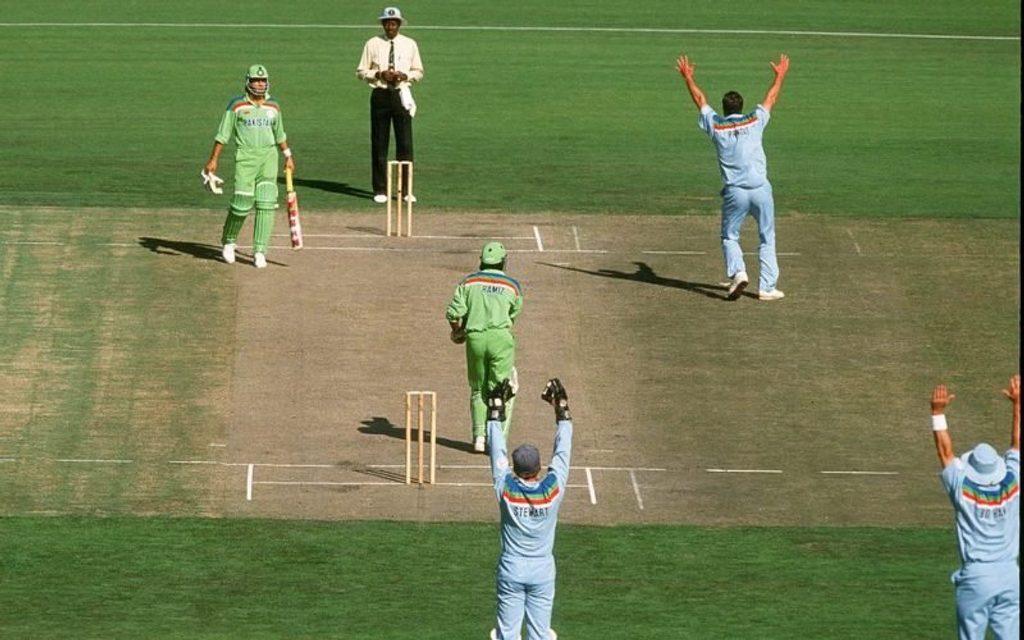
Before the glory of 2019. England never came as close to winning the World Cup as they did at Melbourne in 1992. John Stern spoke to some of the major players from England’s run to the final.
First published in March 2015
First published in March 2015
It was the last time the World Cup was held in Australia and New Zealand. It was also the last time that England reached the final.
The fifth World Cup was the first in coloured clothing. With an all-play-all format that rewarded consistency, it is still remembered with great fondness. Its only black mark was the bizarre rain rule, devised by Richie Benaud, which calculated the revised target for a side batting second by subtracting the lowest-scoring overs from the first-innings total.
England were as well prepared as they could have been. Six weeks of rest after the domestic season was followed by training camps at Lilleshall, privately funded by the sponsorship of benefactor Patrick Whittingdale. Back then this was an eye-opening innovation rather than standard practice – English cricket was some way off the 20th century, never mind the 21st.
That preparation paid off on the tour of New Zealand that preceded the World Cup. England beat their hosts 3-0 in a one-day series and 2-0 in the Tests. “Few tours undertaken by England, or MCC before them, have been as successful as this one,” purred Wisden . “For seven weeks, in fine weather, England played to the peak of their form.” Joining the England team for the one-day leg in New Zealand and the World Cup was a familiar face, in the twilight of his career, whose prior engagements back home had caused him to miss the Tests.
Alec Stewart: We came in to the tournament with a nice degree of confidence. Then we had a certain Sir Ian Botham joining us after appearing in a panto in Bournemouth. So while we were playing Test cricket in New Zealand he’d been appearing as the King in Jack and the Beanstalk, or whatever. To have him in the camp gave us a huge lift – well, it gave me a lift because I hadn’t played with him before. His arrival did also put a certain amount of fear or at least trepidation into the opposition, none more so than the Australians. The hold he still had over them was incredible. He’d be the first to admit he wasn’t in his absolute prime but he was still able to bully them.
Derek Pringle: He looked pretty unfit and there was a bit of a running spat with the tabloid press. There was a guy from the Daily Star [Mike Beale] we used to call ‘Burger’ Beale and Beefy would tell him he was a fat git and ‘Burger’ Beale would tell him he was a fat git.
[breakout id=”0″][/breakout]
England started well, winning three of their first four matches. They beat India by nine runs in Perth. Captain Graham Gooch, in his 100th ODI, made 51 opening with Botham, and Robin Smith 91. West Indies were dispatched by six wickets with Gooch making another blazing half-century –Botham made only eight of the opening stand of 50. In the eight-wicket win over Australia, Botham was Player of the Match with 4-31, his best ODI figures, and a fifty.
Sandwiched in between the victories over West Indies and Australia was a rain-ruined match against Pakistan at Adelaide. Pringle, who was emerging as a key figure in the tournament, made use of two new balls, one at either end, to record figures of 8.2-5-8-3 as Pakistan were bowled out for 74. England finished on 24-1 off eight overs, chasing a revised target of 64 from 16.
Pringle: We thought we’d have won it. It’d have been a forgone conclusion today but maybe not back then with Wasim Akram.
The single point that Pakistan received for that abandonment would prove crucial. They lost three of their first five matches. Meanwhile, England continued their winning ways with a 106-run victory over Sri Lanka. Captain Gooch injured a hamstring but he was not surprised by his team’s form.
Graham Gooch: We had a very good side with quality players and good balance. We had experience with the likes of me, Ian and Allan Lamb, youth with Alec Stewart, Neil Fairbrother and Graeme Hick. We had a good mix of all-rounders – Pringle, Botham, DeFreitas and Lewis – so we had good cover for injuries. And it was a good fielding side.
Stewart: It was a good group of people. It was the best squad for one-day cricket that I was involved with throughout my career.
Even without Gooch, England continued their march with a tense last-ball, three-wicket win over South Africa in Melbourne. Stand-in skipper Stewart made 77 and Lancashire left-hander Neil Fairbrother 75 not out. Next up, though, England went back to New Zealand for the first time since their pre-tournament tour.
[caption id=”attachment_152785″ align=”alignnone” width=”800″] Fairbrother led England’s run-scoring charts at the 1992 World Cup, aggregating 285 runs from seven innings at 57[/caption]
Fairbrother led England’s run-scoring charts at the 1992 World Cup, aggregating 285 runs from seven innings at 57[/caption]
Pringle: The game was at Wellington where we hadn’t played on the tour. The pitch was perfect for New Zealand because it gripped for Dipak Patel’s off-spin and the medium-pace of Chris Harris and Gavin Larsen. We had good cutters and pullers in our team – Lamb, Smith, Hick, Stewie – and suddenly to get on a stodgy old thing and have to work it from the front foot proved difficult for us. If we’d won that match we’d have set a world record [12] for successive one-day wins.
England made only 200-8 and New Zealand won by seven wickets. Pringle also pulled up mid-over with an intercostal injury that would threaten his continued involvement in the tournament. If the New Zealand result was just a minor annoyance, the next match against Zimbabwe proved to be a major embarrassment, even though England had already qualified for the semi-finals. Chasing only 135, England fell nine runs short – given a roasting by chicken farmer Eddo Brandes who took 4-21.
Pringle: Those white balls swung, you see, and Brandes bowled well. Because I was injured I ended up doing some commentary with Gatt [Mike Gatting] on that game. It was pretty galling watching this unfold from the commentary box!
England might have been going off the boil but they were only one game from the final, facing South Africa. Having been put in, England made 252-6 from only 45 overs. Hick top-scored with 83 after surviving an lbw appeal first ball and being caught off a no-ball before he had scored. With South Africa 231-6 from 42.5 overs, rain intervened and their target, off 43 overs, was reduced farcically by a single run. So they required 21 to win off one ball. Bemusement and frustration reigned.
[caption id=”attachment_176092″ align=”alignnone” width=”800″] The scorecard that summed up South Africa’s misfortune[/caption]
The scorecard that summed up South Africa’s misfortune[/caption]
Pringle: South Africans bleat to this day but it was no foregone conclusion that they’d have got those runs. They were six down under the lights at Sydney with the ball moving around. So we didn’t feel sorry for them and cynically they didn’t bowl the last five overs of our innings because we were going well. [The innings was shortened to 45 overs after South Africa didn’t bowl their overs in time].
Stewart: That rain rule was about the only thing Richie Benaud got wrong in his career.
Whatever the manner of their passage, England were in the World Cup final for the third time and for the second successive tournament. They would face Imran Khan’s resurgent Pakistan side who, having been on the point of elimination, had won four matches in a row. Pringle’s intercostal muscle was a major talking point.
David Lloyd (Press Association journalist): It was really nice that Pringle had been a main man. He bowled fantastically well. Before the final everyone was asking anxiously whether he was going to be fit – that must have been quite novel for him.
Pringle: The day before the final I still wasn’t feeling great. I’d done a few ginger warm-ups. But then I just thought f*** it. If I wreck myself then I’ve still got a month and a bit before I have to play for Essex. So I just started bowling in the nets. It hurt a bit at the start but I kept going and bizarrely it started to ease. I couldn’t believe it. I had a second spell and it felt fine. So I said to Goochie: “I don’t want to get your hopes up but I’ve been beating Lamby all ends up and it’s not hurting too much.”
The night before the final there was a formal dinner for both finalists and dignitaries. All was going swimmingly until a comedian, Gerry Connolly, in drag, started poking fun at the Queen.
Gooch: The Pakistanis were in their traditional dress and it was all very grand. Then out of the blue this comedian came on and started to take the mick out of the Queen. Ian and I felt it was out of order. We’re not prudish but we just felt it was in bad taste given the occasion. So we just got up and said to [coach] Micky Stewart, “Sorry we’re out of here”.
[breakout id=”1″][/breakout]
Pringle: If you were a dyed-in-the-wool royalist I could imagine it being offensive but it washed over me. After Goochie and Beefy stormed out, Imran leaned over and told his team: “Look, it’s only the colonials left.” There were seven or eight of us who weren’t born in England.
Stewart: Firstly, you have to question why we were at a big dinner the night before the World Cup final. I guess it was the Australians’ attempt at humour. It was just unnecessary but I didn’t get uptight about it.
Lloyd: The two days before the final had been pretty full-on in terms of work. I’d sent my last piece and breathed a sigh of relief. The match didn’t start until the next afternoon so I could have a meal, a few drinks and not worry about having to get up too early. Somehow word got out that Both and Goochie had left the dinner and I remember going up to the manager Bob Bennett’s room to get the explanation. It must have been well past midnight. It was a good story – even if I didn’t really appreciate it at the time.
Pakistan batted first and scored 249-6 from their 50 overs. Imran pushed himself up the order to No.3 and made 72. But on nine he was missed by Gooch running back from square-leg.
Stewart: It was one of those – was it Goochie’s? Was it Lamby’s [at mid-on]? It’s all ifs and buts. Javed Miandad, who made 58, might have been leg-before to Pringle on nought.
Pringle: Steve Bucknor had given me Ramiz Raja, which I still think was out, but maybe Hawk-Eye might not have done. Maybe he thought he’d given me one or that it might ruin the game. There was no bat involved and I thought if that can’t be out then nothing can.
Stewart: As Derek always says, if DRS had been in use then Miandad would have gone, if not first ball, then certainly second ball. But Bucknor decided there was some way the ball wasn’t hitting the stumps.
[caption id=”attachment_176086″ align=”alignnone” width=”800″] Pringle traps Ramiz Raja leg-before[/caption]
Pringle traps Ramiz Raja leg-before[/caption]
England’s chase started badly with Botham and Stewart going early. Fairbrother (62) and Lamb (31) put on 72 for the fifth wicket. But Wasim Akram bowled Lamb with what Pringle describes as “a bit of devilry” and Chris Lewis chopped on next ball. England never properly recovered and lost by 22 runs.
Pringle: There were a few tears, though I was fairly phlegmatic. It was a great disappointment but I couldn’t have done much more. I went into the Pakistan dressing room and only Imran and Javed were left in there – the rest had run off out of the ground with the trophy. They were running round Melbourne! Javed tapped me on the shoulder and said ‘Allah smiled on me today’. He knew.
Lloyd: Throughout all my time covering England it didn’t really bother me whether they won or lost. The story was the important thing. But after that final I felt drained. I felt sorry for them. I thought they were the best team in the tournament and there were players in that side, like Gooch and Botham, who were never going to play in another World Cup. It was about three in the morning after the final that I finally cranked myself up to write anything.
Happy birthday, Wasim Akram!
Just how good was he in the 1992 World Cup!pic.twitter.com/ekh9MuwsdV
— Wisden (@WisdenCricket) June 3, 2020
Stewart: We ran out of gas a bit as the tournament went on. It was one of the biggest disappointments of my career. We didn’t quite do ourselves justice in the final having played some really good cricket leading up to it. Each World Cup after that got progressively worse – no, they were all as bad as each other. I don’t think we gave ourselves a chance in future tournaments.
Gooch: We went off really strongly but sadly we’d played our best cricket before the final. In tournaments you need to play your best in the latter stages and we didn’t quite get that right. I don’t have any real regrets about my career – I enjoyed 99.9 per cent of it. But playing in all three World Cup finals that England have reached and losing every one – I can’t deny that’s a regret.








